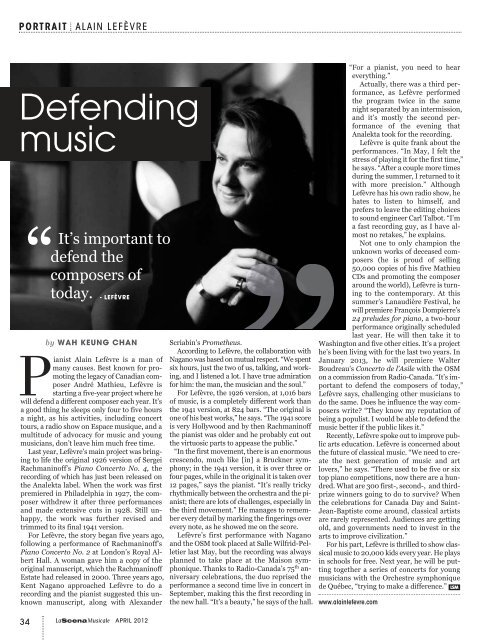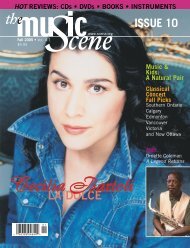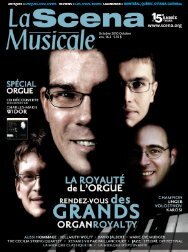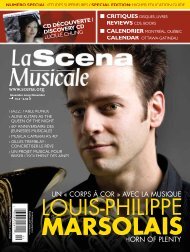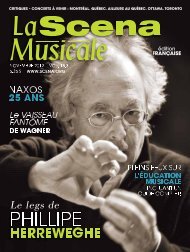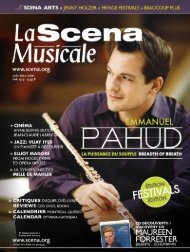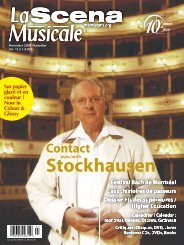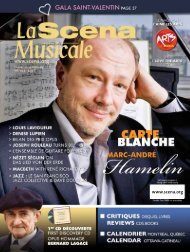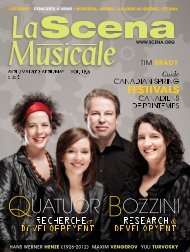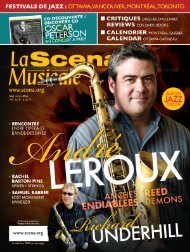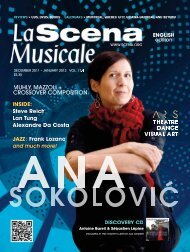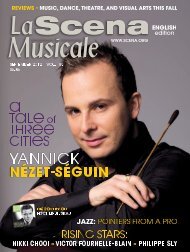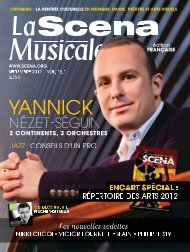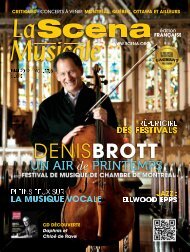The Bohlen-Pierce system - La Scena Musicale
The Bohlen-Pierce system - La Scena Musicale
The Bohlen-Pierce system - La Scena Musicale
Create successful ePaper yourself
Turn your PDF publications into a flip-book with our unique Google optimized e-Paper software.
PORTRAIT ALAIN LEFÈVRE<br />
Defending<br />
music<br />
It’s important to<br />
defend the<br />
composers of<br />
today. - LEFÈVRE<br />
by WAH KEUNG CHAN<br />
Pianist Alain Lefèvre is a man of<br />
many causes. Best known for promoting<br />
the legacy of Canadian composer<br />
André Mathieu, Lefèvre is<br />
starting a five-year project where he<br />
will defend a different composer each year. It’s<br />
a good thing he sleeps only four to five hours<br />
a night, as his activities, including concert<br />
tours, a radio show on Espace musique, and a<br />
multitude of advocacy for music and young<br />
musicians, don’t leave him much free time.<br />
<strong>La</strong>st year, Lefèvre’s main project was bringing<br />
to life the original 1926 version of Sergei<br />
Rachmaninoff’s Piano Concerto No. 4, the<br />
recording of which has just been released on<br />
the Analekta label. When the work was first<br />
premiered in Philadelphia in 1927, the composer<br />
withdrew it after three performances<br />
and made extensive cuts in 1928. Still unhappy,<br />
the work was further revised and<br />
trimmed to its final 1941 version.<br />
For Lefèvre, the story began five years ago,<br />
following a performance of Rachmaninoff’s<br />
Piano Concerto No. 2 at London’s Royal Albert<br />
Hall. A woman gave him a copy of the<br />
original manuscript, which the Rachmaninoff<br />
Estate had released in 2000. Three years ago,<br />
Kent Nagano approached Lefèvre to do a<br />
recording and the pianist suggested this unknown<br />
manuscript, along with Alexander<br />
Scriabin’s Prometheus.<br />
According to Lefèvre, the collaboration with<br />
Nagano was based on mutual respect. “We spent<br />
six hours, just the two of us, talking, and working,<br />
and I listened a lot. I have true admiration<br />
for him: the man, the musician and the soul.”<br />
For Lefèvre, the 1926 version, at 1,016 bars<br />
of music, is a completely different work than<br />
the 1941 version, at 824 bars. “<strong>The</strong> original is<br />
one of his best works,” he says. “<strong>The</strong> 1941 score<br />
is very Hollywood and by then Rachmaninoff<br />
the pianist was older and he probably cut out<br />
the virtuosic parts to appease the public.”<br />
“In the first movement, there is an enormous<br />
crescendo, much like [in] a Bruckner symphony;<br />
in the 1941 version, it is over three or<br />
four pages, while in the original it is taken over<br />
12 pages,” says the pianist. “It’s really tricky<br />
rhythmically between the orchestra and the pianist;<br />
there are lots of challenges, especially in<br />
the third movement.” He manages to remember<br />
every detail by marking the fingerings over<br />
every note, as he showed me on the score.<br />
Lefèvre’s first performance with Nagano<br />
and the OSM took placed at Salle Wilfrid-Pelletier<br />
last May, but the recording was always<br />
planned to take place at the Maison symphonique.<br />
Thanks to Radio-Canada’s 75 th anniversary<br />
celebrations, the duo reprised the<br />
performance a second time live in concert in<br />
September, making this the first recording in<br />
the new hall. “It’s a beauty,” he says of the hall.<br />
“For a pianist, you need to hear<br />
everything.”<br />
Actually, there was a third performance,<br />
as Lefèvre performed<br />
the program twice in the same<br />
night separated by an intermission,<br />
and it’s mostly the second performance<br />
of the evening that<br />
Analekta took for the recording.<br />
Lefèvre is quite frank about the<br />
performances. “In May, I felt the<br />
stress of playing it for the first time,”<br />
he says. “After a couple more times<br />
during the summer, I returned to it<br />
with more precision.” Although<br />
Lefèvre has his own radio show, he<br />
hates to listen to himself, and<br />
prefers to leave the editing choices<br />
to sound engineer Carl Talbot. “I’m<br />
a fast recording guy, as I have almost<br />
no retakes,” he explains.<br />
Not one to only champion the<br />
unknown works of deceased composers<br />
(he is proud of selling<br />
50,000 copies of his five Mathieu<br />
CDs and promoting the composer<br />
around the world), Lefèvre is turning<br />
to the contemporary. At this<br />
summer’s <strong>La</strong>naudière Festival, he<br />
will premiere François Dompierre’s<br />
24 preludes for piano, a two-hour<br />
performance originally scheduled<br />
last year. He will then take it to<br />
Washington and five other cities. It’s a project<br />
he’s been living with for the last two years. In<br />
January 2013, he will premiere Walter<br />
Boudreau’s Concerto de l’Asile with the OSM<br />
on a commission from Radio-Canada. “It’s important<br />
to defend the composers of today,”<br />
Lefèvre says, challenging other musicians to<br />
do the same. Does he influence the way composers<br />
write? “<strong>The</strong>y know my reputation of<br />
being a populist. I would be able to defend the<br />
music better if the public likes it.”<br />
Recently, Lefèvre spoke out to improve public<br />
arts education. Lefèvre is concerned about<br />
the future of classical music. “We need to create<br />
the next generation of music and art<br />
lovers,” he says. “<strong>The</strong>re used to be five or six<br />
top piano competitions, now there are a hundred.<br />
What are 300 first-, second-, and thirdprize<br />
winners going to do to survive? When<br />
the celebrations for Canada Day and Saint-<br />
Jean-Baptiste come around, classical artists<br />
are rarely represented. Audiences are getting<br />
old, and governments need to invest in the<br />
arts to improve civilization.”<br />
For his part, Lefèvre is thrilled to show classical<br />
music to 20,000 kids every year. He plays<br />
in schools for free. Next year, he will be putting<br />
together a series of concerts for young<br />
musicians with the Orchestre symphonique<br />
de Québec, “trying to make a difference.” LSM<br />
www.alainlefevre.com<br />
34<br />
APRIL 2012


